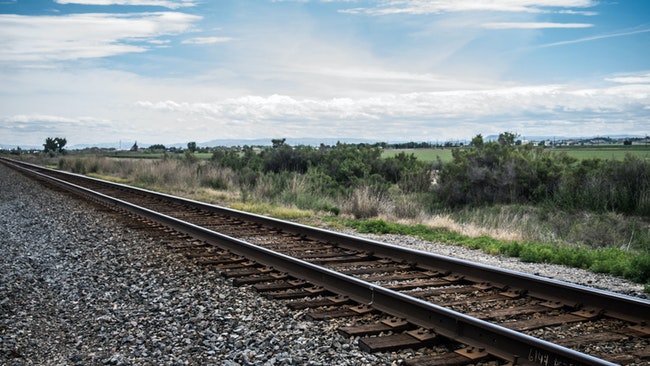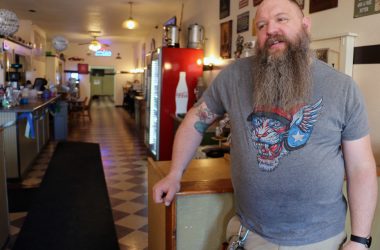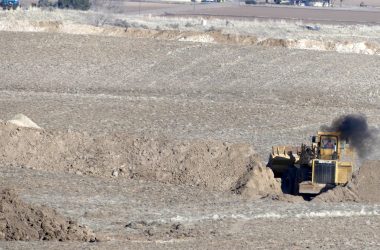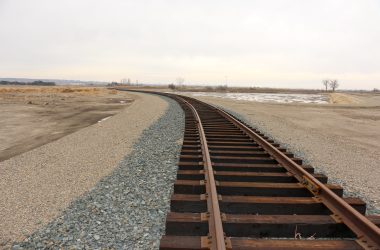
Farmland on the north edge of Nyssa is owned by the public now, but Malheur County says it needs $15 million more to turn it into an industrial park. The funding already is locked in for the Treasure Valley Reload Center. (The Enterprise/file)
Malheur County’s hunt for money to turn farmland into an industrial mecca outside of Nyssa so far has failed.
With enough federal cash, Malheur County envisioned one industrial firm after another moving to the Malheur County Industrial Park, next to the planned rail shipping center.
For a historically poor county, the park was pitched as a place where 300 jobs would one day appear. Those wage earners in turn would pump money into the county economy, a surge unlike any in recent years.
But in September, federal officials turned down Malheur County’s request for $15 million.
The county’s lead economic official, Greg Smith of the Malheur County Economic Development Department, cast the decision as not surprising. Local governments usually have to try up to four years in a row before the U.S. Department of Transportation says yes, he told other county officials.
The federal authorities, however, awarded $5 million this year to Hood River on its first try for the special federal award.
The Enterprise found that the failure of the grant rested not in Washington, D.C., but in Smith’s own shop.
The 730-page application was supposed to justify Malheur County’s need for federal money needed for the park. The county said it would spend $3 million to build a new half-mile street from U.S. 26 to the park, $3 million for more rail spurs and $4 million for unspecified “site equipment.” The county also said it needed $5 million for new sewer and water lines described as an “imperative” to allow “additional site development.”
However, available records show that Smith and his team provided little of what federal authorities requested of those seeking a federal award. Meantime, Smith’s company received from the county a monthly payment of $6,000 for nearly two years in part to prepare the application.
According to federal documents, the application prepared by Smith and his team was supposed to explain how the $15 million for an industrial park would help smooth transportation issues in the area, give local residents better access to services, and generally improve the life of people in Malheur.
Analysis of the application by the Enterprise could find none of that.
Instead, the book-length application extolled the virtues of a separate but adjacent project that needed no money from the federal government – the Treasure Valley Reload Center.
The rejection of the application leaves Malheur County with approximately 142 acres of bare land it can’t afford to improve.
Smith didn’t respond to two sets of detailed written questions about the application but said in a public meeting last week that “we have received requests, many legit requests, from the Malheur Enterprise.”
Invited to review excerpts of this story, Smith responded on Friday without identifying any factual errors.
“I’m sorry you are not better informed about the status of the project and economic development in Malheur County,” he wrote. “Thank you for sharing.”
No member of the board of the Malheur County Development Corp. responded to requests for comment or addressed questions sent to Smith. The public board was set up by the county to oversee development of the rail center, including Smith’s work on the project. The corporation listed itself as a partner in the bid for federal money.
The board members include Grant Kitamura of Baker and Murakami Produce Co., Kay Riley of Snake River Produce, Jason Pearson of Eagle Eye Produce, Corey Maag of Jamieson Produce, Randy Svaty of Northwest Farm Credit Services, state Sen. Lynn Findley and Smith.
In 2018, county authorities picked a 290-acre farm parcel as the place for the rail center. The Treasure Valley Reload Center will use just 65 acres of the ground, is in line to receive $26 million in state money and construction now is scheduled to start in January. The remaining useable property is destined to become the Malheur County Industrial Park.
Smith operates the county economic development department as a contractor, paid $8,000 a month for that work.
In June 2018, he asked the Malheur County Court – County Judge Dan Joyce and Commissioners Don Hodge and Larry Wilson – for an extra $6,000 a month.
He wrote the commissioners that the money would allow his company to bring on a new employee to handle three tasks. A key was to pursue what is called the BUILD grant – an annual federal award of nearly $1 billion for transportation projects across the country.
The commissioners said yes, and Greg Smith & Co. LLC started collecting the extra $6,000 a month in July 2018 under a contract that was expected to last one year.
But a year came and went, and Smith’s crew made little progress on the complex work of the application needed to get the federal money, according to public records released last year by Malheur County.
In late 2019, the county commissioners plunged ahead to buy the Nyssa ground, but had to scramble to find the cash to close the $3 million deal. They borrowed about $2 million from the state under terms that make local taxpayers pay the interest, and then reached into the county’s emergency fund for nearly $1 million more.
For months, Smith and county commissioners declined to explain where the money would come from to make the Malheur County Industrial Park rise out of the dirt. Wilson later said the county had no ability to cover the costs out of its own pocket.
After nearly two years of work, Smith’s team turned in its application to the U.S. Department of Transportation.
In that application, Smith’s team recycled information it had already been paid to turn over to the state back in 2018. An analysis by the Enterprise showed instance after instance of cut-and-paste of language used to convince Oregon officials to fund the reload center.
And in 737 pages of material, an electronic search found no mention of the Malheur County Industrial Park. The phrase “industrial park” appears seven times – and for the first time 15 pages into the document.
The package included a letter of support jointly offered by U.S. Sen. Ron Wyden and U.S. Sen. Jeff Merkley and one from U.S. Rep. Greg Walden. The letters were all dated just days before the application was due – and didn’t mention the industrial park. Instead, they urged federal authorities to back the Treasure Valley Reload Center – already paid for with state funds.
That means federal authorities had virtually none of the information required to assess whether Malheur County’s industrial park qualified for the $15 million.
The federal agency, for instance, wanted to know “how the project would improve safety outcomes within the project area or wider transportation network, to include how the project will reduce the number, rate, and consequences of transportation-related accidents, serious injuries, and fatalities.”
Malheur County’s application contained no such information relating to the industrial park.
Smith said in an Oct. 15 email that “most likely we will have to strengthen this component of the application.”
The federal agency wanted to know “the extent to which the project contributes to the functioning and growth of the economy, including the extent to which the project addresses congestion or freight connectivity, bridges service gaps in rural areas, or promotes the expansion of private economic development.”
Smith said in an Oct. 15 email that “we addressed this question adequately in the application.”
Malheur County’s application contained no such information relating to the industrial park.
The federal agency wanted to know how the project “expands access to essential services for people in communities across the United States, improves connectivity for citizens to jobs, health care, and other critical destinations, particularly for rural communities, or otherwise addresses the quality of life criterion.”
Smith said in an Oct. 15 email that “we addressed this question adequately in the application.”
Malheur County’s application contained no such information relating to the industrial park.
Across the state, Medford city officials learned that federal authorities look closely at such applications to see they fit the requirements.
City Manager Brian Sjothun said his city’s application for $15.5 million was twice rejected, in part because the city hadn’t finished a key land transaction. He said the agency’s requirements for information were clear and “fairly easy” to answer. He said city officials traveled to Washington, D.C., to meet with federal authorities to learn why the application was denied.
Sjothun said the city fixed the application, winning approval last year.
On the coast, the Port of Coos Bay succeeded on its first try in 2018. Margaret Barber, who handles grant work for the port, said the agency “tried to address every single aspect that was required” in the application by the federal authorities.
“Sometimes people will apply for funds for a program that is not necessarily the best match,” Barber said, speaking generally about government grant efforts. “Is this a project that has a good alignment for what they’re looking for?”
Reporter Pat Caldwell contributed to this story.
Contact Editor Les Zaitz by email at [email protected].
GET YOUR LOCAL NEWS FROM PROFESSIONALS: Reader support allows the Enterprise to provide in-depth, accurate reporting that otherwise would not get done. Keeping the community well informed is essential. SUBSCRIBE – $5 a month, automatically. DONATE – to provide additional support.




